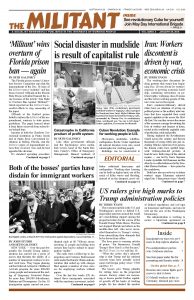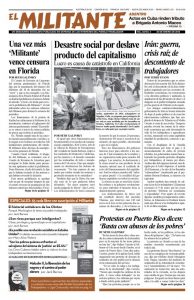When Spanish Prime Minister Mariano Rajoy, who ousted the pro-independence parliament and seized control of the government of Catalonia last fall, called snap elections there for Dec. 21, he hoped a slate of candidates pledged to unity with Madrid would win. But the vote dashed his hopes.
While the Citizens, a party that opposes breaking away from Spain, got the largest vote, the parties advocating independence got more votes overall and won a majority of the seats in parliament.
Rajoy’s People’s Party, which governs Spain, lost big, seeing its vote cut in half, going from 11 seats to four.
The elections took place in a polarized political situation. Madrid imposed direct rule after the Catalan parliament declared independence following an Oct. 1 referendum the government declared illegal. Madrid tried to stop it by brute force, sending 10,000 Civil Guards and hundreds of soldiers. More than 1,000 people were injured in clashes with government forces.
Rajoy’s party has led attacks, some violent and thuggish, against Catalan national rights for the past decade.
Rajoy then sacked the Catalan president, government, members of parliament and numerous civil servants. Leaders of parties and organizations favoring independence were imprisoned and slapped with charges carrying decadeslong prison sentences. Catalan President Carles Puigdemont fled to Belgium, to avoid arrest.
Hundreds of thousands hit the streets of Barcelona protesting the crackdown and demanding Madrid free the arrested leaders. Sizable demonstrations took place both in favor of and opposing independence.
Of the pro-independence parties, Puigdemont’s Together for Catalonia got the highest vote. Parliament convened Jan. 17 and will vote in the next couple weeks to elect its president. Puigdemont is seeking re-election and says he will preside from Brussels, via Skype or some other electronic setup.
But Rajoy said Jan. 15 that if parliament elects Puigdemont, Madrid will void the whole election and continue direct rule.
Under the pressure, some of those elected as independence delegates have begun to back off. Marta Rovira general secretary of the Republican Left, a large pro-independence party, said Jan. 13 that forces who favor a Catalan state need to “face all difficulties with absolute realism.”
In a Jan. 12 hearing at the Supreme Court, Joaquim Forn and Jordi Sánchez, two pro-independence leaders who are being held by the government on charges from last fall’s vote, said they would give up their seats in the new parliament if it continued pushing for a break with Spain. Forn, who had been interior minister, and Sanchez both ran on Puigdemont’s ticket.
Polarization reflects social class
The polarization around independence in Catalonia is part of the differentiated responses of social classes to the conditions generated by capitalism’s worldwide crisis. The steep 2007-2008 downturn increased economic and class divisions throughout the imperialist world, and more so in Spain, including Catalonia, than in many other countries.
Substantial sections of urban professionals and middle-class layers, university students and many farmers press for independence with the anti-working-class argument that Catalonia shouldn’t be saddled with having to “subsidize” the central government budget and its preferential treatment for regions in Spain where workers have lower wages and worse working and social conditions.
Because of Catalonia’s large industrial base, workers over decades have moved there from the rest of Spain, from Europe and beyond, searching for jobs and improved working conditions. Some don’t speak Catalan and see unemployment, wages, health care and other social protections as far more burning issues than self-rule.
And all too often, Catalan pro-independence governments have joined forces with the federal rulers in attacks on workers’ living conditions. This had weakened support for independence in some layers of the working class.
The elections reflected these different class responses. Puigdemont’s party won the vast majority of the rural areas across the region. The pro-Spain Citizens party won the vote in the urban areas around Barcelona, Tarragona and Lleida. It also got the highest vote in many of the working-class districts around Barcelona. Puigdemont’s party got a substantially lower vote there than in the region as a whole.
Albert Rivera, leader of the Citizens, told El Pais Jan. 15 that the two most important issues for the party are unemployment and Spanish unity.

